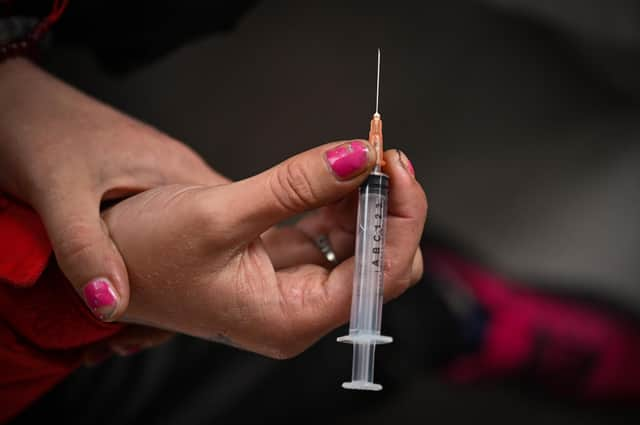Scotland's drug-deaths scandal: We need a government that's willing to take responsibility and not just blame Westminster – Christine Jardine MP


Accepting that she had, in her words, taken her eye off the ball, over the number of drug deaths in Scotland did not, I am sure, come across the way that she intended. Nevertheless it is out there now.
I suspect that Nicola Sturgeon meant it as a genuine acknowledgement that her government has not done enough and, if re-elected, will try harder. But, for many of us, it stung.
Advertisement
Hide AdAdvertisement
Hide AdIt felt as if she was saying that her government somehow perceived this as a minor issue, something just to keep an eye on. A secondary problem simmering away at the back of a hob while attention was focused elsewhere.
Regardless of the intention, this Scottish government’s record on drugs deaths has now been placed centre stage in the election campaign.
And it doesn’t look good.
Since the last Scottish election, there have been 4,250 drugs deaths. Of those, almost 1,264 were in 2019, the most recent year for which figures are available.
That is a death rate almost three times what it was when the SNP came to power in 2007. And it is the worst rate not just in the UK, but in Europe.
I am sorry if it offends the First Minister, but I don’t see that as taking your eye off the ball. I see that as not noticing there is a ball at all.
But those are just statistics. Each one of those 4,250 deaths represents a family left desolate by the death of a loved one.
A life stamped out amidst an epidemic that is destroying futures every day, and yet seems to go unnoticed alongside Covid.
Just recently, a mother in Livingston allowed the BBC to film the funeral of their son who had died of an overdose of street Valium.
Advertisement
Hide AdAdvertisement
Hide AdTheir heartbreak was difficult to watch. The death of any child, any young person, is the most traumatic of experiences for a family.
But Nathan Hadlow’s mother wanted his story to serve as a warning to others.
To ensure that his death did not just become another anonymous number, she was brave enough to share her experience.
To remind politicians of the grief caused by our common failure to tackle successfully the problem of drugs on our streets, she let us witness it.
What makes that failure worse is that there are examples close at hand of how it can be achieved.
Portugal, for example, had one of the worst problems in Europe. In 1999, one in every 100 people there had a problematic drug addiction. The country’s HIV rate was also the highest in the EU.
Then, in 2001, they completely changed tack from the previous criminalisation of drugs so that now if someone is caught with personal supply of any drug they receive a warning, a fine or are referred to a multidisciplinary team of doctors, lawyers and social workers.
The rates of overdose deaths and drug-related crime plummeted under the new approach and an HIV rate which in 2000 was 104 people per million had fallen to only 4.2 people per million by 2015.
Advertisement
Hide AdAdvertisement
Hide AdThere is also internationally accepted evidence that drug-consumption rooms are vital to reducing rates.
According to the European Monitoring Centre on Drugs, it takes the most vulnerable users away from injecting on the streets, unprotected, where there is a much higher risk of overdose or blood-borne virus contracted by using dirty needles.
Their findings were based on research in the Netherlands, Germany and Spain where they have tackled the problem much more successfully than we have.
Perhaps one of the things which frustrates me most is when Scottish politicians say, “but drugs policy is reserved. Blame Westminster”.
It happened again this week on Question Time and, for me, it shows a complete lack of respect, not just for those struggling with a drugs problem, but for all of us.
Yes, the Misuse of Drugs Act 1971 is now half a century old and even an update 20 years ago does not have any reflection of the modern approach to the problem.
Both pieces of legislation were enacted when the now-discredited ‘war on drugs’ was the preferred approach.
Many of us at Westminster are currently working to have that legislation updated. But the slowness in legislation does not excuse lack of action here.
Advertisement
Hide AdAdvertisement
Hide AdScotland’s communities have suffered more from this failure than their counterparts elsewhere in the UK under the same legislation.
And there are widespread fears in the social work and drug action spheres that the figures for 2020 will be even worse when they are released later this year.
Community services would have been operating in a limited capacity during lockdown and the mental health results of the pandemic will probably lead to another spike.
HIV figures have also increased and the Scottish government’s £15 million reduction in the rehab budget has also meant fewer beds and treatments are available.
The UK advisory committee on the misuse of drugs recommended safe room introduction back in 2016. Nothing has happened.
No doubt the finger will be pointed at Westminster for that and, in truth the UK government is not blameless.
But passing the buck, and the blame, does not save lives or address the problem.
We need education, social action, health spending on projects designed to help and a Scottish government willing to take responsibility and focus all its attention on the problem.
Advertisement
Hide AdAdvertisement
Hide AdFamilies all over Scotland live in constant dread of a knock at the door.
The fear that their loved one will become another name on the already too long list of those who have fallen victim to drugs.
It’s long past time we did something to end that nightmare.
Christine Jardine is the Scottish Liberal Democrat MP for Edinburgh West
